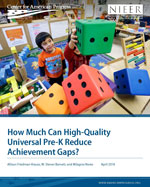 A new study by the Center for American Progress finds that high quality preschool programs for all youngsters could significantly reduce the racial achievement gaps in reading and mathematics. The study examines the success of the Early Childhood Four-Year-Old Program in Oklahoma and the Pre-K Program of the Boston Public School System.
A new study by the Center for American Progress finds that high quality preschool programs for all youngsters could significantly reduce the racial achievement gaps in reading and mathematics. The study examines the success of the Early Childhood Four-Year-Old Program in Oklahoma and the Pre-K Program of the Boston Public School System.
The results of these two programs show that if similar high quality, pre-K programs were enacted nationwide, the gap in mathematical achievement for African American children would be reduced by 45 percent and the gap in reading achievement would be eliminated.
On the release of the new report, Katie Hamm, senior director of early childhood policy at the Center for American Progress, states that “this research demonstrates what we are losing out on by not implementing a high-quality universal pre-K program on a national scale, and what we stand to gain if we move toward a national, public solution to pre-K. Today’s report adds to the growing body of research surrounding the many benefits of universal pre-K. There is plenty of strong empirical evidence to support expanding pre-K at the national level, but quality is key to positively impacting children’s development.”
The full report, How Much Can High-Quality Universal Pre-K Reduce Achievement Gaps?, can be downloaded by clicking here.


Partial information can sometimes be more dangerous than outright lies. The truth of the matter is that the gap may be closed in the earliest elementary grades. However, by middle school years, unless there is ongoing substantive conversation and reading, coupled with enhanced vocabulary and syntax — as opposed to orders, yelling, and dismissive grunts — on a regular basis, falling back into that gap is easier than wearing the hippest haircut, reciting the latest music video lyrics, or picking up the remote… .